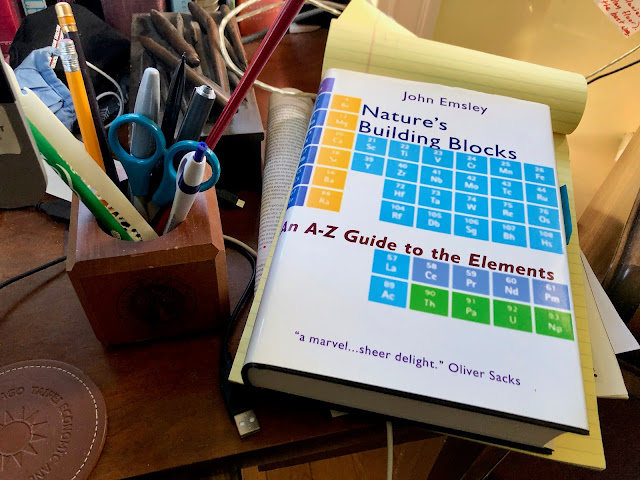 |
| Photo by Caren Jeskey |
North Shore Bureau Chief Caren Jeskey was, however, and in her typical reliability and professionalism did not disappoint. Her report is understandably brief and blunt, reflecting a numb day that was a shock though not a surprise.
A friend lives on Randolph near the lake, and I am lucky to be enjoying her home (and adorable, tiny pooch named Holly after Mrs. Golightly) while she takes a long weekend away. Jeanne Gang’s Vista Tower fills the window in front of me, and her Aqua Tower also adorns the picturesque frame. Whenever I see Gang's buildings I marvel at the empowered woman who made them happen. A modern day superhero. Aqua Tower was the tallest woman-designed building in the world at the time it was constructed in 2007. Her buildings blend in perfectly with Chicago's skyline, and though they are taller than the other buildings around here, they are elegantly understated and delightful to behold. Her structures are eco-friendly with recycled materials and rooftop prairies and gardens. Gang's Harvard trained eye is a great gift to our city. At the same time that women's power is being supported in many ways, today we face the day after Roe v. Wade was overturned despite the fact that “Gallup polls show Americans’ support for abortion in all or most cases at 80% in May 2021, only sightly higher than in 1975 (76%), and the Pew Research Center finds 59% of adults believe abortion should be legal.” I called a friend yesterday afternoon and she greeted me in tears. “Did you hear?" Yes, I’ve heard. Lately I’ve been feeling like I do not have the bandwidth to deal with the larger issues our country is facing, then I recall that I have to conjure up the will to care.
When we were in our late teens, or perhaps early 20's, another friend and I were invited to a Thanksgiving gala hosted by an important person. I can’t say who it was, since I have to be mindful about legal repercussions, so I'll suffice it to say that we were at a party that only a privileged few Illinoisans were invited to. During the dinner and subsequent party, a prominent young man became enamored with my friend, and she with him. They found a way to “see” each other- this word conjures up puritanical suppression of sexuality à la the play Spring Awakening (my first COVID play) that I saw this past Spring at Porchlight. In this heavy and tragic performance, secrecy, shame, and denial killed 2 young people and traumatized others.
After one long date, my friend became impregnated with her suitor's child. She really liked him but at that point he was done with her. Before she could even catch her breath, he had arranged for an abortion. He was a monied financier, she was a nothing in comparison at that time, as far as privilege was concerned. She felt she had no choice. After the mandated abortion she was dropped off at my parent's house where I was living. She came up to my bed and passed out from exhaustion. She slept off the physically and emotionally taxing removal of the embryo from her womb. It was not yet a fetus, which happens at eight weeks.
I wonder what her life would look like today, had this person been truly interested in the gem of a woman she is — stunning, brilliant, and now very successful- and they had developed more of a relationship?
Now we can all be worried about the women who are going to be harmed during back-alley abortions on top of everything else this decade has cursed us with. It's time to help in any way we can. Vote, march, donate money to help women get to Illinois and other safe havens when they need it. And try to stay out of the line of fire of the armed haters.
By Caren Jeskey
"Good ideas come from everywhere. It's more important to recognize a good idea than to author it.” — Jeanne Gang
A friend lives on Randolph near the lake, and I am lucky to be enjoying her home (and adorable, tiny pooch named Holly after Mrs. Golightly) while she takes a long weekend away. Jeanne Gang’s Vista Tower fills the window in front of me, and her Aqua Tower also adorns the picturesque frame. Whenever I see Gang's buildings I marvel at the empowered woman who made them happen. A modern day superhero. Aqua Tower was the tallest woman-designed building in the world at the time it was constructed in 2007. Her buildings blend in perfectly with Chicago's skyline, and though they are taller than the other buildings around here, they are elegantly understated and delightful to behold. Her structures are eco-friendly with recycled materials and rooftop prairies and gardens. Gang's Harvard trained eye is a great gift to our city. At the same time that women's power is being supported in many ways, today we face the day after Roe v. Wade was overturned despite the fact that “Gallup polls show Americans’ support for abortion in all or most cases at 80% in May 2021, only sightly higher than in 1975 (76%), and the Pew Research Center finds 59% of adults believe abortion should be legal.” I called a friend yesterday afternoon and she greeted me in tears. “Did you hear?" Yes, I’ve heard. Lately I’ve been feeling like I do not have the bandwidth to deal with the larger issues our country is facing, then I recall that I have to conjure up the will to care.
When we were in our late teens, or perhaps early 20's, another friend and I were invited to a Thanksgiving gala hosted by an important person. I can’t say who it was, since I have to be mindful about legal repercussions, so I'll suffice it to say that we were at a party that only a privileged few Illinoisans were invited to. During the dinner and subsequent party, a prominent young man became enamored with my friend, and she with him. They found a way to “see” each other- this word conjures up puritanical suppression of sexuality à la the play Spring Awakening (my first COVID play) that I saw this past Spring at Porchlight. In this heavy and tragic performance, secrecy, shame, and denial killed 2 young people and traumatized others.
After one long date, my friend became impregnated with her suitor's child. She really liked him but at that point he was done with her. Before she could even catch her breath, he had arranged for an abortion. He was a monied financier, she was a nothing in comparison at that time, as far as privilege was concerned. She felt she had no choice. After the mandated abortion she was dropped off at my parent's house where I was living. She came up to my bed and passed out from exhaustion. She slept off the physically and emotionally taxing removal of the embryo from her womb. It was not yet a fetus, which happens at eight weeks.
I wonder what her life would look like today, had this person been truly interested in the gem of a woman she is — stunning, brilliant, and now very successful- and they had developed more of a relationship?
Now we can all be worried about the women who are going to be harmed during back-alley abortions on top of everything else this decade has cursed us with. It's time to help in any way we can. Vote, march, donate money to help women get to Illinois and other safe havens when they need it. And try to stay out of the line of fire of the armed haters.








